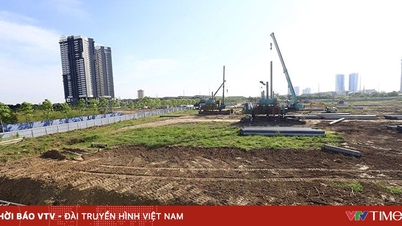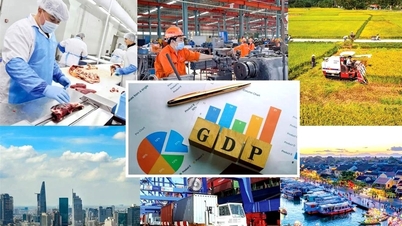
Illustration photo.
However, in addition to the bright spots in terms of scale and contribution to the economy , the market is showing signs of hot growth, housing prices are increasing far beyond real income, potentially creating a "bubble" and increasing the gap between rich and poor in society. The Vietnam Association of Realtors (VARS) believes that solutions are needed to "brake" the hot growth of housing prices.
* When house prices "far exceed" real income
According to the General Statistics Office, in recent years, the construction and real estate sectors have contributed an average of about 10% of the country’s GDP. The real estate sector alone accounts for about 3.5%, contributing 0.5 percentage points to annual GDP growth.
However, this ratio is still only half of the average of many countries in the region. The scale of real estate value compared to the total national economic assets is only about 21%, significantly lower than the 35% in developed countries. This shows that the Vietnamese market still has significant room for growth.
However, the rapid growth of the market in recent years is showing its unsustainability, most clearly shown in the imbalance between supply and demand. The product structure mainly focuses on the high-end, high-value segment, while the real demand of the majority of people lies in the affordable housing group...
Experts say that the housing supply has increased rapidly over the past three years but is not balanced. Even in suburban areas – where affordable products are expected to be provided – the actual price is still much higher than the average income. New price levels are constantly being established, seriously reducing people's access to housing.
A survey by VARS shows that a two-bedroom apartment in an urban area costs about VND5 billion, which is currently beyond the affordability of most households. Assuming a family with an income of VND50 million/month, if they spend all their income, they will need about 8 years to buy a house. If spending on housing does not exceed 1/3 of their income as recommended by the financial sector, the time will be extended to 25 years - VARS cited.
Even social housing – a housing segment designed for low-income earners – is gradually becoming “out of reach” for beneficiaries. With a price of about 1.5 billion VND for a 60 m2 apartment, even a household with an income of 40 million VND/month – the maximum level according to the approval criteria – would have to save up for nearly 10 years to buy one, not to mention the actual borrowing and living expenses.
Rapidly rising housing prices not only reduce housing opportunities but also lead to worrying socio-economic consequences. The difference in housing accessibility makes the gap between those who have assets and those who do not have assets increasingly "fixed". Those who already own real estate continue to benefit from price increases, while those who do not own a house are forced to rent long-term, making it difficult to accumulate assets.
In fact, the growth of the real estate market in recent years has mainly benefited a small group of people with financial potential, while the majority of people feel "poorer" despite increased income. This is a trend that potentially creates wealth inequality if there is no timely regulatory policy - VARS analyzed.
Dr. Nguyen Minh Phong - an economic expert commented that housing prices increasing much faster than income is an alarming problem in the current real estate market. This situation not only reduces people's access to housing but also pushes the economy into the risk of an asset "bubble".
Therefore, the most important solution is to consider the development of affordable and social housing as a strategic priority, similar to transport infrastructure or energy. When real demand is met, the market will balance itself, reducing the incentive for speculation and bringing prices to a more reasonable level.
At the same time, it is necessary to tighten speculative activities, increase taxes on short-term trading, and create favorable financial mechanisms for first-time home buyers. Without strong enough policies, housing prices will continue to climb, creating an ever-widening gap between rich and poor, Mr. Phong suggested.
* Unblocking supply sources, perfecting policies
According to VARS, for the market to develop stably, it is necessary to quickly implement solutions to "brake" the rapid increase in housing prices; in which the focus is on clearing the supply of affordable housing. When the supply is large enough and balanced, the market will self-regulate according to the law of supply and demand, limiting speculation and unreasonable price increases.
First of all, it is necessary to speed up the completion of documents guiding the implementation of the new law system on land, housing and real estate business. At the same time, it is necessary to improve the enforcement capacity of local agencies, strengthen decentralization and delegation of authority in adjusting policies, ensuring flexibility appropriate to each region and development stage.
The bottlenecks in site clearance also need to be resolved in a transparent and effective manner, shortening the implementation time while still ensuring the rights of the people. Along with considering the abolition of the regulation on collecting additional 5.4%/year of late land use fees for projects with land allocation or land lease decisions before August 1, 2024, it is necessary to soon issue a clear and stable method of determining land prices, which will help reduce project development costs and create room to lower housing prices - VARS proposed.
In addition, it is necessary to diversify capital mobilization channels for the real estate market, reducing dependence on bank credit. Restructuring the corporate bond market to become an effective medium and long-term capital channel is also one of the necessary directions. At the same time, it is necessary to promote the formation of the National Housing Fund, encourage the development of Real Estate Investment Trusts (REITs) to create a stable and transparent source of capital for the market.
Mr. Nguyen Van Dinh - Chairman of the Vietnam Association of Real Estate Brokers (VARS) emphasized that the recent increase in housing prices clearly reflects the imbalance between supply and demand. While real housing demand accounts for the majority, supply is concentrated in the high-end segment. The scarcity of affordable products has pushed prices up, leading to a prolonged "overheating" phenomenon.
To “brake” the price increase, it is necessary to unblock reasonable supply sources, especially the supply of affordable housing in urban and suburban areas. Along with that, it is necessary to diversify investment capital sources, develop medium and long-term mobilization channels such as investment trust funds (REITs) or national housing funds, instead of depending on bank credit.
When legal issues are resolved, supply increases and capital flows become more stable, the real estate market will develop healthily and sustainably, both meeting people's housing needs and positively contributing to economic growth, Mr. Dinh emphasized.
One of the issues that needs special attention is that social housing and affordable housing need to be prioritized in planning, supported by specific incentive policies. At the same time, urban development must go hand in hand with the development of transport infrastructure - especially belt lines, metro and highways to expand urban space, reduce population density and reduce pressure on land prices in the central area.
At the same time, it is necessary to develop a professional housing rental market, reduce the mentality of "having to own a house to stabilize life", and aim to diversify housing options for people.
In addition, management agencies need to develop a set of indicators and early warning criteria to monitor real estate market developments. This monitoring system will help promptly detect signs of "deviation" such as speculation, unusual price increases or imbalances in supply and demand, thereby proactively taking appropriate intervention measures, instead of passively handling when risks arise in the market.
Finally, VARS believes that it is necessary to accelerate the construction of a unified and transparent national land and housing database. This is an important foundation to help management agencies, researchers and businesses analyze, forecast and operate the market accurately and promptly.
When the data system is open and interconnected between ministries, branches and localities – including information on planning, transactions, values, legality and land use changes – it will contribute to improving transparency, reducing speculation and protecting the rights of people and businesses.
Source: https://vtv.vn/gia-dinh-thu-nhap-50-trieu-dong-thang-khong-tieu-gi-8-nam-moi-mua-duoc-nha-100251110200032923.htm


































































































![Dong Nai OCOP transformation: [Article 4] Reaching national standard products](https://vphoto.vietnam.vn/thumb/402x226/vietnam/resource/IMAGE/2025/11/11/1762825820379_4702-cac-san-pham-trai-cay-chung-nhan-ocop-nongnghiep-174649.jpeg)


![Dong Nai OCOP transition: [Article 3] Linking tourism with OCOP product consumption](https://vphoto.vietnam.vn/thumb/402x226/vietnam/resource/IMAGE/2025/11/10/1762739199309_1324-2740-7_n-162543_981.jpeg)






Comment (0)